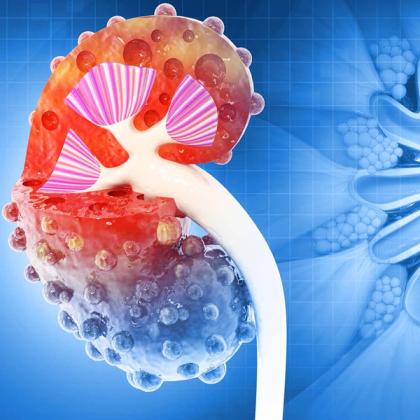Ep 163 – Chronic kidney disease among adults in primary care: testing, diagnosis and referral

Posted 3 Jul 2025
Dr Hannah Rosa, Dr Will Hinchliffe
In the first of a two-episode series on chronic kidney disease (CKD), Dr Hannah Rosa is joined by Dr Will Hinchliffe, a Consultant in Renal and General Medicine working in the North East and North Cumbria. They discuss which people are at risk of CKD, how to test for it and diagnose it and, lastly, which patients require a referral to secondary care. This episode is mostly based on the NICE guideline on assessment and management of CKD and aims to help you to improve the lives of your patients by diagnosing CKD earlier and referring those who may benefit from specialist input sooner.
Key take-home points
- People with any of the following are at increased risk of CKD:
- diabetes
- hypertension
- cardiovascular disease
- obesity
- a previous episode of acute kidney injury
- a family history of end-stage renal disease or hereditary kidney disease
- structural renal tract disease, recurrent renal calculi, or prostatic hypertrophy
- multisystem diseases with potential kidney involvement, for example, systemic lupus erythematosus
- gout
- incidental detection of haematuria or proteinuria
- medications such as calcineurin inhibitors (for example, ciclosporin or tacrolimus), lithium or long-term use of non-steroidal anti-inflammatory drugs.
- NICE advises testing people with any of the above risk factors (except for obesity alone) for CKD.
- The two tests used to diagnose CKD are estimated glomerular filtration rate (eGFR) and urine albumin-to-creatinine ratio (UACR). If, over 3 months, the eGFR remains <60 mL/min/1.73 m2 or UACR remains >3 mg/mmol, we can then diagnose CKD. If an initial UACR is ≥70 mg/mmol then there is no need to repeat it, but we should re-check a UACR of 3–70 mg/mmol with an early morning sample to confirm the result.
- NICE, in its guideline, has a table that categorises CKD. Based on the eGFR there are categories G1, G2, G3a, G3b, G4 and G5, and based on the UACR result there are categories A1, A2 and A3. Based on both categories, a person is then deemed to be at low, moderate, high or very high risk of adverse outcomes. NICE also has a second table which guides us as to how many times a year a person should have their CKD monitored, as a minimum.
- When making a diagnosis of CKD, as well as making a note of the results, we should also stop to think about the cause, particularly if the cause may be treatable.
- NICE advises that we consider a referral for the following reasons:
- a 5-year risk of needing renal replacement therapy of greater than 5%, measured using the four-variable Kidney Failure Risk Equation
- a sustained decrease in eGFR of 25% or more and a change in eGFR category within 12 months
- a sustained decrease in eGFR of ≥15 mL/min/1.73 m2 per year
- UACR ≥70 mg/mmol, unless known to be caused by diabetes and already appropriately treated
- UACR ≥30 mg/mmol together with haematuria (although remember that haematuria with or without proteinuria usually warrants prompt investigations for urinary tract malignancy)
- hypertension that remains poorly controlled despite the use of at least four antihypertensive medicines
- a known or suspected rare or genetic cause of CKD
- suspected renal artery stenosis or recurrent nephrolithiasis.
- Also consider referral if there is a suspected complication of CKD, for example:
- persistent anaemia (haemoglobin <10 g/dL) if eGFR is <30 mL/min/1.73m2, as erythropoietin and intravenous iron may help quality of life
- any previous episode where serum potassium has breached 6 mmol/L (CKD is likely in this group due to reduced excretory capacity).
- An urgent referral or discussion may be needed with a specialist service if there is:
- an eGFR <15 mL/min/1.73 m2
- acute kidney injury
- suspected nephrotic syndrome
- malignant hypertension
- a systemic illness, such as myeloma, which has renal involvement.
Key references
- NICE. 2021. https://www.nice.org.uk/guidance/ng203.
- Medscape UK. 2025. https://img.medscapestatic.com/vim/live/professional_assets/medscape/prof_documents/CKDHackIdentificationMay2025v4.pdf.
- Kidney Research UK. https://www.kidneyresearchuk.org/conditions-symptoms/chronic-kidney-disease/.
- The Kidney Failure Risk Equation. https://www.kidneyfailurerisk.co.uk/.
- Grams M, et al. 2018. https://ckdpcrisk.org/lowgfrevents/.
Create an account to add page annotations
Add information to this page that would be handy to have on hand during a consultation, such as a web address or phone number. This information will always be displayed when you visit this page